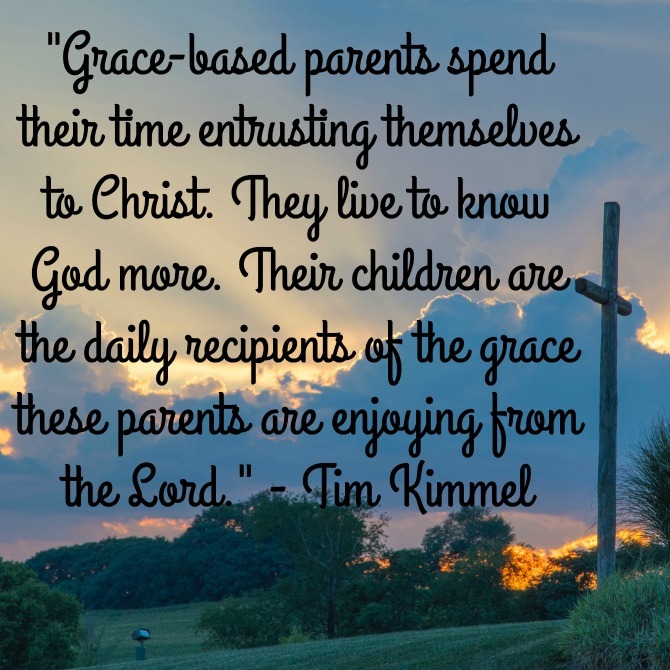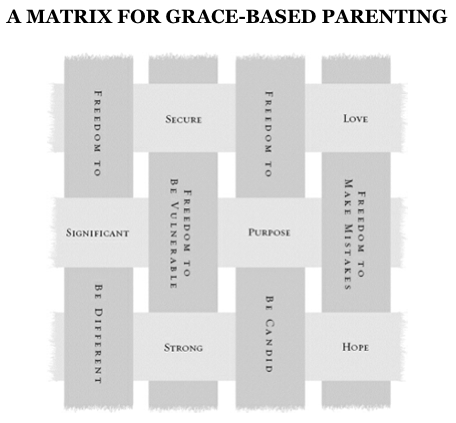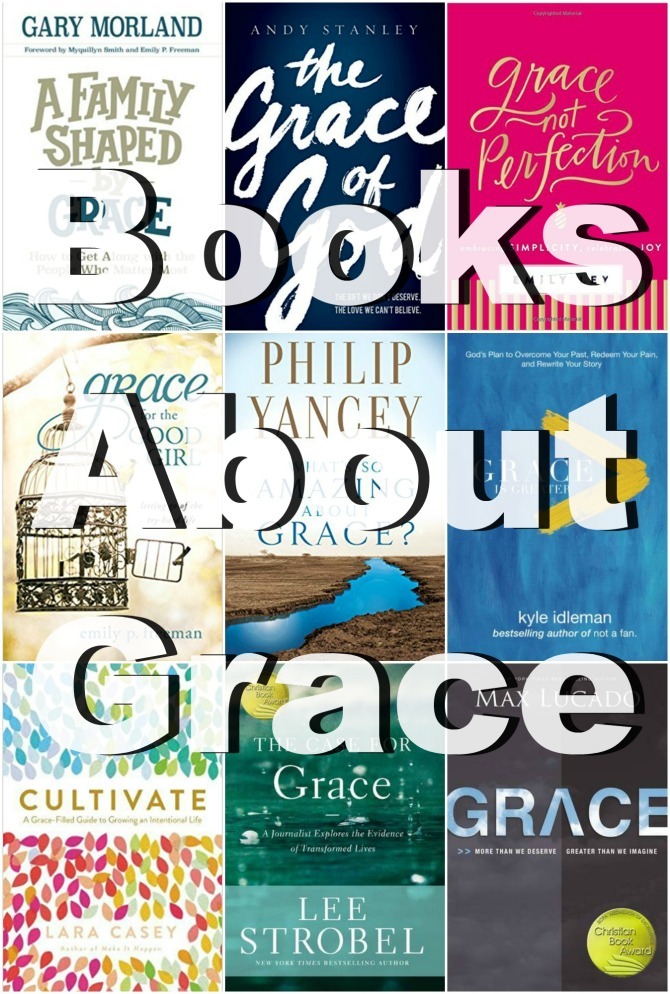One of the best aspects of choosing a new word each year is that it gives me a fresh lens through which to view the world for the next twelve months. In past years I’ve found myself spotting my words in everything from life experiences to movies I’m watching, and this year with Grace is proving to be no different. We are less than a month into the new year, but I’ve already had many “grace opportunities”: instances where I’ve shown grace to others, opened my heart up to God’s grace, or even tuned out the voice of Perfectionism and instead been gracious to myself in the face of my personal shortcomings.
I will continue to be on the lookout for Grace over the next eleven months, and I don’t know any better way to gear up for this sort of project than to turn to books! Which is why I named “a book that relates to my word for 2018” as my January Reading Challenge book.
Because Grace is a broad theme, I could have taken this challenge category in an number of different directions. I might have opted for a book about embracing imperfections, or a Gospel-centric book about the gift of God’s grace. Many novels are centered around the theme of grace so I could even have gone the fiction route. Instead I decided to read a book that could help me understand what grace looks like in one of the biggest parts of my life: the arena of parenting
Tim Kimmel’s Grace Based Parenting was actually on my list of books I hoped to read in 2015! I received a paperback copy for Christmas the month before Charleston was born, and read the first chapter shortly after his birth, but for some reason (likely the sleep deprivation that made it hard to read almost anything), I set it aside. I kept hearing great things about this book, though, so the following year I purchased it in digital form, thinking that a new format would get me reading. No luck. The book has been lingering on the To Read shelf of my Kindle ever since. But when I chose Grace as my 2018 word, I knew this book’s time had come.
Many parenting books, especially those geared towards Christian parents, are primarily concerned with behavior. Not all of those books are bad, and many offer wonderful strategies and solutions and are written from a very healthy and altruistic place. However, it’s easy to spend so much time focusing on how our children act that we neglect to pay attention to what’s going on in their hearts. And it’s the heart that matters most.
As a follower of Jesus, my primary goal as a parent—above absolutely everything else—is to raise a child who knows and loves Jesus Christ as his personal Lord and Savior. I cannot guarantee that Charleston will grow up loving the Lord, but I can provide a strong foundation. There are a number of ways to go about this, but few have anything to do with behavior modification. I believe that modeling God’s grace in my own interactions with Charleston is a much healthier and more productive place to start. That’s a lot easier said than done, though, and it can be difficult to know what grace within parenting actually looks like. Which is where Tim Kimmel’s book comes in.

Dr. Kimmel begins his book with an exploration of various parenting models (fear-based parenting, image-control parenting, etc.) and explanations of how they lead Christian parents to stray from effective parenting paths. He emphasizes the fact that rigid boundaries are just as harmful as nonexistent ones because both can undermine the work of the Holy Spirit, and “how children turn out is far more contingent on what is going on inside them than outside them.” He goes on to explain the grace is the defining characteristic of the Christian faith; it is therefore crucial that parents portray grace accurately to our children, balancing grace with truth and standards to avoid cheapening it.
The remainder of the book is dedicated to outlining and illustrating Dr. Kimmel’s recipe for a grace-based home, which begins with meeting children’s needs for LOVE, PURPOSE, and HOPE. I had never viewed these as attributes of grace, and loved this simple formula, as well as Dr. Kimmel’s detailed stories about how to infuse our lives and our homes with these three ingredients. According to Dr. Kimmel’s Matrix for Grace-Based Parenting, these components are found in homes where children are given: 1) the freedom to be different; 2) the freedom to be vulnerable; 3) the freedom to be candid; and 4) the freedom to make mistakes. It sounds almost too simple, but by the end of the book Dr. Kimmel had me convinced that adopting these principles could truly result in a family characterized by grace.

I’ll admit to having a bit of trepidation heading into this book, simply because there were so many ways it could go wrong. I worried Dr. Kimmel might take grace too far by advocating for permissive parenting. Or, that the pendulum might swing the other way and this would simply be another discipline book couched in more PC language. But I was wrong. Dr. Kimmel’s message embodies the Grace displayed in the Gospel, which is compassionate AND concerned with a commitment to God’s standards. There is nothing black or white about Dr. Kimmel’s message, only plenty of appropriate nuance.
Another personal hangup was that I thought I might be too early in the parenting game to glean much useful information from this book. That reservation also proved unfounded. Grace Based Parenting offers plenty of suggestions for parenting kids of all ages, from babies through adulthood. And unlike may similar books I’ve read, Dr. Kimmel’s examples effectively illustrate the principles he is describing without getting too cheesy or dull.
I am incredibly glad that I read this book and hope to return to it periodically as my parenting journey continues. I’ve asked Luke to add it to the top of his To Read queue and will be recommending it to all of my Christian mama friends. Grace Based Parenting proved to be an excellent way to get get my year of GRACE off to a strong start.
My Rating: 5 stars.

OTHER BOOKS ABOUT GRACE
I love how each of these titles approaches the theme of grace in such a unique way. I hope to keep my theme going strong in 2018 by reading at least a few of these books this year. Below, I’ve included portions of the Publishers’ synopsis with each title.
Cultivate: A Grace-Filled Guide to Growing an Intentional Life, by Lara Casey — “Welcome to the journey of getting messy in the rich soil of possibility—embracing imperfect, grace-filled progress to grow a life of joy.”
Grace for the Good Girl: Letting Go of the Try-Hard Life, by Emily P. Freeman — “What would happen if we let grace pour out boundless acceptance into our worn-out hearts and undo us? If we dared to talk about the ways we hide, our longing to be known, and the fear in the knowing?”
Grace Is Greater: God’s Plan to Overcome Your Past, Redeem Your Pain, and Rewrite Your Story, by Kyle Idleman — “Through the powerful medium of story, Grace Is Greater leads readers past their hang-ups toward an understanding of grace that is bigger than our mistakes, our failures, our desire for revenge, and our seemingly impossible situations.”
Grace, Not Perfection: Embracing Simplicity, Celebrating Joy, by Emily Ley — “Designed with Emily Ley’s signature aesthetic, this book gives women tangible ways to simplify their lives to give space to what matters most. With a focus on faith, Emily reminds readers that God abundantly pours out grace on us—and that surely we can extend grace to ourselves.”
Grace: More Than We Deserve, Greater Than We Imagine, by Max Lucado — “In this cornerstone message of Lucado’s ministry, he challenges readers to not only receive grace but also to be changed by grace. Shaped by grace. Strengthened by grace. Emboldened by grace. Softened by grace. Snatched by the nape of their neck and shaken to their senses by grace.”
A Family Shaped by Grace: How to Get Along With the People Who Matter Most, by Gary Morland — “Gary Morland lived in an unhappy, dysfunctional family characterized by addiction and disharmony. When he started a family of his own, he brought with him those same destructive patterns. Yet he sensed there must be a way to have a family shaped by acceptance and grace, a family that was loving, whole, and at peace with one another. “
The Grace of God, by Andy Stanley —“When we are on the receiving end, grace is refreshing. When it is required of us, it is often disturbing. But when correctly applied, it seems to solve just about everything. This struggle is not new; it has been going on since the beginning.”
The Case for Grace: A Journalist Explores the Evidence of Transformed Lives, by Lee Strobel — “Lee Strobel crafts a compelling and highly personal case for God, focusing on God’s transforming work in the lives of men and women today. Writing with unusual candor, Lee draws upon his own journey from atheism to Christianity to explore the depth and breadth of God’s redeeming love for spiritually wayward people.”
What’s So Amazing About Grace, by Philip Yancey — “If grace is God’s love for the undeserving, he asks, then what does it look like in action? And if Christians are its sole dispensers, then how are we doing at lavishing grace on a world that knows far more of cruelty and unforgiveness than it does of mercy?Yancey sets grace in the midst of life’s stark images, tests its mettle against horrific ungrace.”

Have you read any great books about grace that you would recommend? Or any awesome parenting books? I’d love to hear about them! I’m also curious: if you’ve chosen a word for your year, do you plan to read any books this year related to that word? Leave me a comment to tell me about it!


[…] Grace-Based Parenting, by Tim Kimmel ~ A wonderful and practical look at how to use grace-based discipline to teach our children about Jesus. This book showed me how my word for the year could relate to my parenting. (Review) […]